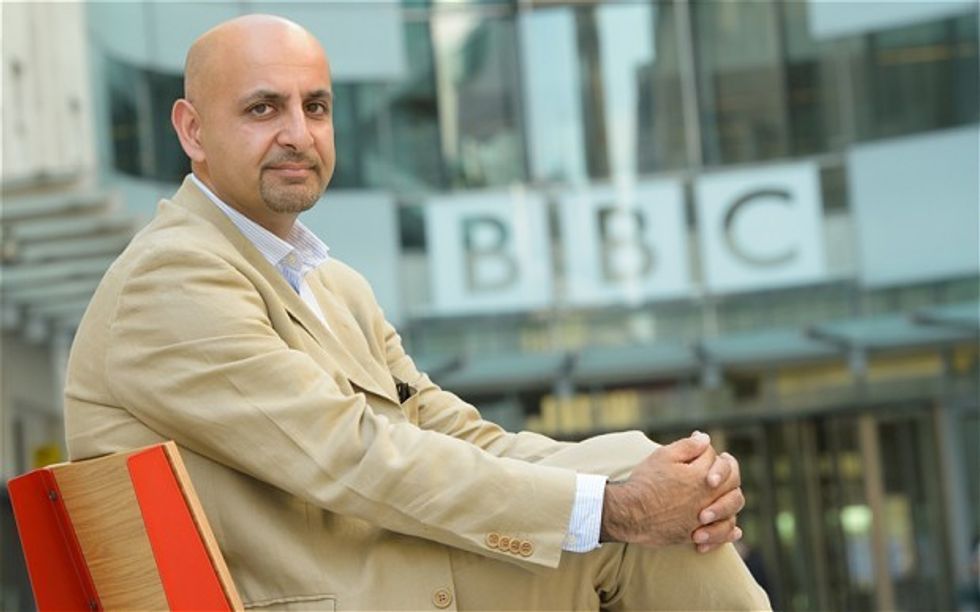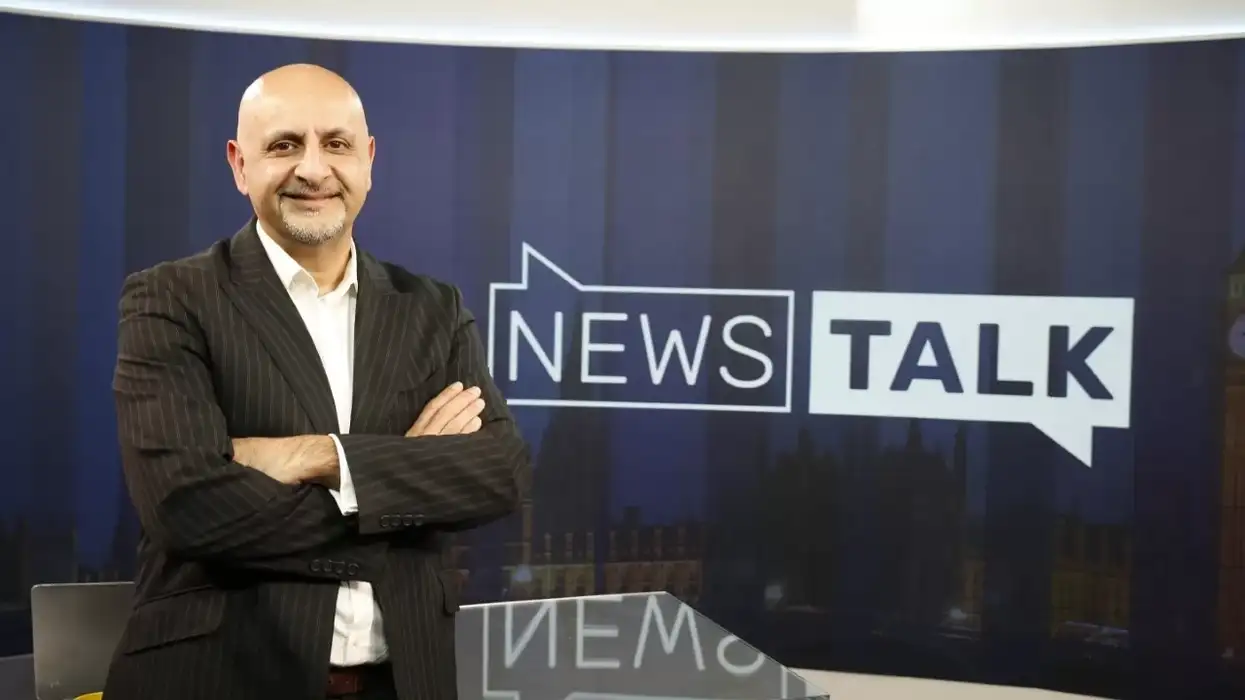Aaqil Ahmed should not have succeeded. Working class. A northerner. Brown. A Muslim. Definitely an outsider. Definitely a maverick.
When you look at his 30-year career, which he celebrates this year, you know that sheer hard work, determination and bloody-mindedness – the south Asian way – were just some of the weapons in his extensive armoury.
Oh, and being kind to others, really caring for them, nurturing and developing talent are part of his character too.
“For me, it was always about having the right people and having different kinds of voices,” Ahmed told Eastern Eye.
“So, when you’ve been an outsider, and I've always been an outsider. In the towns that we lived in, we were Asian when [most] people were white.
“We went to the madrasa. They were all Indian, we were Pakistani. I went to art school, went to film school, I ended up at the BBC working in multicultural programming and Asian programmes, so never in the mainstream.
“So, when you do get to the mainstream, you may come to it and have a completely different kind of perspective, which is what I did.”
Today, he is much in demand.
A professor of media at the University of Bolton. A non-executive director at the broadcasters’ watchdog, OfCom.
And, because he has not enough to do, Ahmed is creative director on the Islam Channel and the host of News Talk, its topical current affairs programme.
Think Andrew Marr meets Muslims, only better because Ahmed knows his audience and what it wants.
“Maybe it's my own kind of naivete at times, but when we had the first ever show, which was on Cop 26 and the environment we had three guests, and they were all women,” he said.
“It was only when the MP Naz Shah mentioned it to me on air that it dawned on me, oh yeah, we've got three women on.
“Of course, we try not to have an all-male panel. We've not had that happen yet. But the fact of the matter is, all three were Muslim women, one from Bradford, one from London, one from Scotland.
“Obviously, you'll see now it's appearing here and here and there, but you're not having this kind of representation on general subjects in the mainstream media.”
“Nothing off bounds”
Remember, the Islam Channel is a business. Like all businesses it must be commercially viable. So, does that mean some topics are taboo?
Definitely not, said the 52-year-old.
“If you know anything about the kind of programmes that I've made over the years, you’ll know I've made tens of hours of programming on suicide bombing, and terrorism and conflict and all those kinds of things, and I haven’t got in trouble once.
“So as far as I'm concerned, if you can make the first ever programme on the life of the prophet Muhammad or the Quran in prime time, and not get it wrong, then I think that shows that, over the years, my teams have had the ability to navigate these kinds of territories.
“I am of the belief that editorially, and I say this to all the students that I teach as well, no subject should be off bounds.
“The questions you have to ask yourself are, how do you do it? Why are you doing it? And who are you doing it for?
“And if you bring that back to the Islam Channel, as a commercial broadcaster, there'll be times when we're not going to touch subjects, because it won't be the right thing for our audience, because they're not interested.”
What sets Ahmed’s programme apart from others of the genre is that it looks at topical issues – the pandemic, climate change and terrorism – through an Islamic lens.
Where mainstream will do the negative sensationalism bit when a story breaks, Ahmed will follow the story to its conclusion, no matter how it ends.
“We had Salman Butt, he was the guy who Priti Patel and the Home Office had to apologise to.
“He had five, six years of being called an extremist preacher, hate preacher, when that wasn't the case.
“Now our team got him on the show. We gave him 15 minutes.
“He was lovely as well. And I remember that when it was being pitched to me, I was reading around it, and I kept on thinking, this all seems a bit weird.
“I just asked him to explain. I said, ‘Look, did you get off on a technicality?’ He goes no, the reason why you can't find anything is because it really was just a huge mistake that nobody would admit to for many, many years.
“Eventually, when they admitted to it, it all quickly unravelled, and he said now I've got an apology from the Home Office. They've expunged it from the internet.
“I can tell you from bitter personal experience, that when he was charged, he was all over the press.
“When the apology comes in, where were they then?”
Bollywood or Bust
That tenacity to speak truth to power is born of his working class roots and his father’s influence.
Ahmed grew up in 1970s Britain where the P-word was rampant and skinheads would chase south Asians to beat them, so called “P*** bashing”.
Yet, if you see his Twitter feed, he will wax lyrical about some white indy group from the 1980s, including The Jam and Paul Weller.
You sense that he is full of unexpected surprises that will leave many open-mouthed thinking Ahmed is not white society’s idea of how a Muslim behaves.
“I went to art school in Wigan, and then film school in central London, which in those days was very different to what it is now.
“I'm going to horrify a lot of the kids probably, I studied graphic design before computers, so all by hand.
“My degree in film was actually an honours degree in photography, film and video, not media practice.
“I've been approached by head-hunters a couple of times to run Oxford colleges, and I do say to them, you know, I didn't go to Oxford or Cambridge, right? And they go, yeah, that won't matter, but it always will.”
In 1992, Ahmed took a huge risk by accepting a two-month contract with the BBC’s multicultural programming unit in Birmingham.
He never looked back. From being a researcher on shows like Network East he progressed to producing Bollywood or Bust, a cinema quiz show. The last series in 1996 was hosted by a certain unknown who would become a national treasure, Sanjeev Bhaskar.

“Sanjeev and Nitin Sawhney were a double act called Secret Asians.
“About 30 years ago, a colleague and I saw them at the Warwick Arts Centre, and we talked to them and auditioned Sanjeev.
“On Bollywood or Bust I let him do some of his character sketches.
“He kept pestering me saying, we should do an Asian sketch show, and I kept saying no one's gonna watch an Asian sketch show.
“What do I know? He went off, proved me wrong and history is written by somebody else.”
Risk taker
Panorama, Here and Now – prestigious BBC programmes – followed. Then he moved to Everyman, a religious programme where he was deputy editor, when fate intervened.
“I bumped into an old friend from Birmingham who worked with me in Asian programmes.
“She told me that she was working at Channel 4 as a commissioner in entertainment.
“I told her I was doing Everyman, and we exchanged business cards.
“I literally bumped into her on the street walking, just as you do, and not seen her for 10 years, and she said we must go for a coffee.
“I thought well, I’ll never see her again. But a week later, she called me up and said that she was in a meeting, and Channel 4 were trying to find a commissioner for religion, and she mentioned me.
“So, they called me in for a chat, and at the end of it, I realised that they were selling me the role.”
For six years he commissioned award-winning programmes for Channel 4. We are talking about the Emmys and Royal Television Society awards, gongs which most in the industry can only dream about.
Several times the BBC tried to woo him back, but Ahmed refused putting condition after condition.
In the end the corporation asked him to apply for the post of head of religion. He successfully went through a competitive selection process.
Despite criticism from the Archbishop of Canterbury, several thousand signing a petition, and a vicious media campaign, he took the job.
“If you're a person of colour, and you get that kind of job, then you can't be, even in my case, overqualified for that job.
“It had to be a political decision, rather than you simply being the best person for that job at that time.
“That's what I learned from that period. Social media was not around then.
“Now, the slightest little thing can happen, and people get made into martyrs, and it's all ‘oh my God, this can't be allowed to happen’.
“And I say, you try going through what I went through. Front page on newspapers and even the Archbishop of Canterbury allegedly wading in.”
What he faced was nothing short of Islamophobia.
“A journalist turned up at my dad's house. My dad being my dad he told them off.
“One of my old academics at university phoned me up and said, ‘We had a journalist turn up asking questions about you at university.
“‘We got him escorted off the property once he started asking questions about, what was what was he like? Did he have a girlfriend? Did you have a drug problem?’”
Diversity
Once back inside the corporation, few know the extent of the changes he made. It was a quiet revolution where, very naturally, without a fuss, the BBC had someone who understood the need for creative diversity.
At one stage the BBC Sunday Morning Live programme had a team on and behind the screen who were majority south Asian. It was not a deliberate attempt; it was because they were the best people for the job.
“I hired so many people, taking risks, nobody else did that. I know lots of people in this game, who are diverse, who talk a good game but ask them to point to what did you do when you had power?
“Most of the work I did with colleagues in the diversity area you will never know I was involved in and I’m very happy with that”.
Those that really know Aaqil, know that he is a humble man. He is not in it for himself, and the next generation of media producers are being taught by one of the best in the business.
But he realises the danger of being pigeon holed as the “guy who can do diversity”.
“The reality is that, if I had been somebody who was not from a diverse background, and then pulled it off on a regular basis, people would listen more.
“But if you're from an ethnic minority background, and you deliver good diversity on a regular basis, no one really cares at all that you've done it.
“It's one thing to not get the credit, I can live with that. It's another thing when people will then suddenly start thinking, well, that's all that person does and for them it’s easy.
“He's very good at the diverse stuff, and you think to yourself, well, no, these are mainstream shows that just happen to have diverse talents on them.”
If they are clever, decision makers in the industry will listen to what Ahmed has to say.
His thoughts and sentences are peppered with great insight, common sense, and his demonstrable ability to take creative risks. Something so lacking in today’s broadcast industry.
News Talk is on the Islam Channel, Thursday evening at 9pm on Sky 737.




